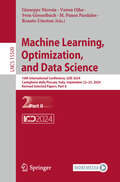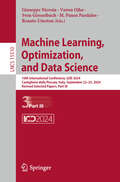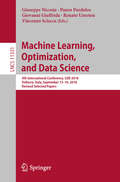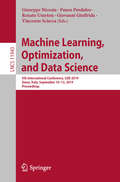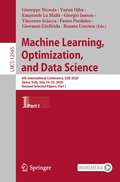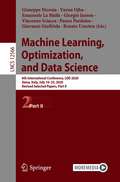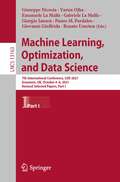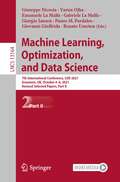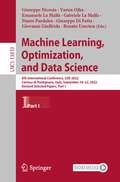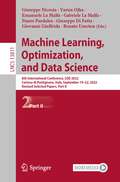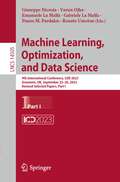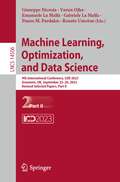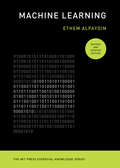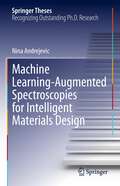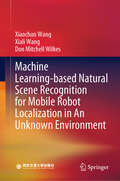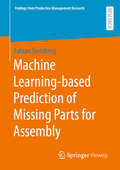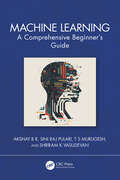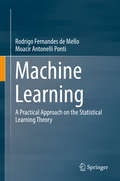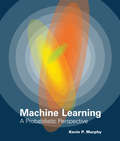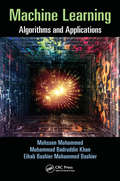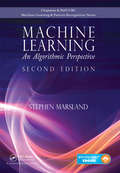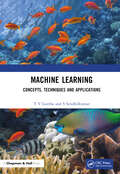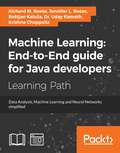- Table View
- List View
Machine Learning, Optimization, and Data Science: 10th International Conference, LOD 2024, Castiglione della Pescaia, Italy, September 22–25, 2024, Revised Selected Papers, Part II (Lecture Notes in Computer Science #15509)
by Giuseppe Nicosia Renato Umeton Varun Ojha Sven Giesselbach M. Panos PardalosThe three-volume set LNAI 15508-15510 constitutes the refereed proceedings of the 10th International Conference on Machine Learning, Optimization, and Data Science, LOD 2024, held in Castiglione della Pescaia, Italy, during September 22–25, 2024. This year, in the LOD Proceedings decided to also include the papers of the fourth edition of the Symposium on Artificial Intelligence and Neuroscience (ACAIN 2024). The 79 full papers included in this book were carefully reviewed and selected from 127 submissions. The LOD 2024 proceedings focus on machine learning, deep learning, AI, computational optimization, neuroscience and big data that includes invited talks, tutorial talks, special sessions, industrial tracks, demonstrations and oral and poster presentations of refereed papers.
Machine Learning, Optimization, and Data Science: 10th International Conference, LOD 2024, Castiglione della Pescaia, Italy, September 22–25, 2024, Revised Selected Papers, Part III (Lecture Notes in Computer Science #15510)
by Giuseppe Nicosia Renato Umeton Varun Ojha Sven Giesselbach M. Panos PardalosThe three-volume set LNAI 15508-15510 constitutes the refereed proceedings of the 10th International Conference on Machine Learning, Optimization, and Data Science, LOD 2024, held in Castiglione della Pescaia, Italy, during September 22–25, 2024. This year, in the LOD Proceedings decided to also include the papers of the fourth edition of the Symposium on Artificial Intelligence and Neuroscience (ACAIN 2024). The 79 full papers included in this book were carefully reviewed and selected from 127 submissions. The LOD 2024 proceedings focus on machine learning, deep learning, AI, computational optimization, neuroscience and big data that includes invited talks, tutorial talks, special sessions, industrial tracks, demonstrations and oral and poster presentations of refereed papers.
Machine Learning, Optimization, and Data Science: 4th International Conference, LOD 2018, Volterra, Italy, September 13-16, 2018, Revised Selected Papers (Lecture Notes in Computer Science #11331)
by Panos Pardalos Giuseppe Nicosia Giovanni Giuffrida Renato Umeton Vincenzo SciaccaThis book constitutes the post-conference proceedings of the 4th International Conference on Machine Learning, Optimization, and Data Science, LOD 2018, held in Volterra, Italy, in September 2018.The 46 full papers presented were carefully reviewed and selected from 126 submissions. The papers cover topics in the field of machine learning, artificial intelligence, reinforcement learning, computational optimization and data science presenting a substantial array of ideas, technologies, algorithms, methods and applications.
Machine Learning, Optimization, and Data Science: 5th International Conference, LOD 2019, Siena, Italy, September 10–13, 2019, Proceedings (Lecture Notes in Computer Science #11943)
by Panos Pardalos Giuseppe Nicosia Giovanni Giuffrida Renato Umeton Vincenzo SciaccaThis book constitutes the post-conference proceedings of the 5th International Conference on Machine Learning, Optimization, and Data Science, LOD 2019, held in Siena, Italy, in September 2019. The 54 full papers presented were carefully reviewed and selected from 158 submissions. The papers cover topics in the field of machine learning, artificial intelligence, reinforcement learning, computational optimization and data science presenting a substantial array of ideas, technologies, algorithms, methods and applications.
Machine Learning, Optimization, and Data Science: 6th International Conference, LOD 2020, Siena, Italy, July 19–23, 2020, Revised Selected Papers, Part I (Lecture Notes in Computer Science #12565)
by Panos Pardalos Giuseppe Nicosia Giovanni Giuffrida Renato Umeton Vincenzo Sciacca Varun Ojha Emanuele La Malfa Giorgio JansenThis two-volume set, LNCS 12565 and 12566, constitutes the refereed proceedings of the 6th International Conference on Machine Learning, Optimization, and Data Science, LOD 2020, held in Siena, Italy, in July 2020.The total of 116 full papers presented in this two-volume post-conference proceedings set was carefully reviewed and selected from 209 submissions. These research articles were written by leading scientists in the fields of machine learning, artificial intelligence, reinforcement learning, computational optimization, and data science presenting a substantial array of ideas, technologies, algorithms, methods, and applications.
Machine Learning, Optimization, and Data Science: 6th International Conference, LOD 2020, Siena, Italy, July 19–23, 2020, Revised Selected Papers, Part II (Lecture Notes in Computer Science #12566)
by Panos Pardalos Giuseppe Nicosia Giovanni Giuffrida Renato Umeton Vincenzo Sciacca Varun Ojha Emanuele La Malfa Giorgio JansenThis two-volume set, LNCS 12565 and 12566, constitutes the refereed proceedings of the 6th International Conference on Machine Learning, Optimization, and Data Science, LOD 2020, held in Siena, Italy, in July 2020. The total of 116 full papers presented in this two-volume post-conference proceedings set was carefully reviewed and selected from 209 submissions. These research articles were written by leading scientists in the fields of machine learning, artificial intelligence, reinforcement learning, computational optimization, and data science presenting a substantial array of ideas, technologies, algorithms, methods, and applications.
Machine Learning, Optimization, and Data Science: 7th International Conference, LOD 2021, Grasmere, UK, October 4–8, 2021, Revised Selected Papers, Part I (Lecture Notes in Computer Science #13163)
by Panos M. Pardalos Giuseppe Nicosia Giovanni Giuffrida Renato Umeton Varun Ojha Emanuele La Malfa Giorgio Jansen Gabriele La MalfaThis two-volume set, LNCS 13163-13164, constitutes the refereed proceedings of the 7th International Conference on Machine Learning, Optimization, and Data Science, LOD 2021, together with the first edition of the Symposium on Artificial Intelligence and Neuroscience, ACAIN 2021.The total of 86 full papers presented in this two-volume post-conference proceedings set was carefully reviewed and selected from 215 submissions. These research articles were written by leading scientists in the fields of machine learning, artificial intelligence, reinforcement learning, computational optimization, neuroscience, and data science presenting a substantial array of ideas, technologies, algorithms, methods, and applications.
Machine Learning, Optimization, and Data Science: 7th International Conference, LOD 2021, Grasmere, UK, October 4–8, 2021, Revised Selected Papers, Part II (Lecture Notes in Computer Science #13164)
by Panos M. Pardalos Giuseppe Nicosia Giovanni Giuffrida Renato Umeton Varun Ojha Emanuele La Malfa Giorgio Jansen Gabriele La MalfaThis two-volume set, LNCS 13163-13164, constitutes the refereed proceedings of the 7th International Conference on Machine Learning, Optimization, and Data Science, LOD 2021, together with the first edition of the Symposium on Artificial Intelligence and Neuroscience, ACAIN 2021. The total of 86 full papers presented in this two-volume post-conference proceedings set was carefully reviewed and selected from 215 submissions. These research articles were written by leading scientists in the fields of machine learning, artificial intelligence, reinforcement learning, computational optimization, neuroscience, and data science presenting a substantial array of ideas, technologies, algorithms, methods, and applications.
Machine Learning, Optimization, and Data Science: 8th International Workshop, LOD 2022, Certosa di Pontignano, Italy, September 19–22, 2022, Revised Selected Papers, Part I (Lecture Notes in Computer Science #13810)
by Panos Pardalos Giuseppe Di Fatta Giuseppe Nicosia Giovanni Giuffrida Renato Umeton Varun Ojha Emanuele La Malfa Gabriele La MalfaThis two-volume set, LNCS 13810 and 13811, constitutes the refereed proceedings of the 8th International Conference on Machine Learning, Optimization, and Data Science, LOD 2022, together with the papers of the Second Symposium on Artificial Intelligence and Neuroscience, ACAIN 2022. The total of 84 full papers presented in this two-volume post-conference proceedings set was carefully reviewed and selected from 226 submissions. These research articles were written by leading scientists in the fields of machine learning, artificial intelligence, reinforcement learning, computational optimization, neuroscience, and data science presenting a substantial array of ideas, technologies, algorithms, methods, and applications.
Machine Learning, Optimization, and Data Science: 8th International Workshop, LOD 2022, Certosa di Pontignano, Italy, September 19–22, 2022, Revised Selected Papers, Part II (Lecture Notes in Computer Science #13811)
by Panos Pardalos Giuseppe Di Fatta Giuseppe Nicosia Giovanni Giuffrida Renato Umeton Varun Ojha Emanuele La Malfa Gabriele La MalfaThis two-volume set, LNCS 13810 and 13811, constitutes the refereed proceedings of the 8th International Conference on Machine Learning, Optimization, and Data Science, LOD 2022, together with the papers of the Second Symposium on Artificial Intelligence and Neuroscience, ACAIN 2022. The total of 84 full papers presented in this two-volume post-conference proceedings set was carefully reviewed and selected from 226 submissions. These research articles were written by leading scientists in the fields of machine learning, artificial intelligence, reinforcement learning, computational optimization, neuroscience, and data science presenting a substantial array of ideas, technologies, algorithms, methods, and applications.
Machine Learning, Optimization, and Data Science: 9th International Conference, LOD 2023, Grasmere, UK, September 22–26, 2023, Revised Selected Papers, Part I (Lecture Notes in Computer Science #14505)
by Panos M. Pardalos Giuseppe Nicosia Renato Umeton Varun Ojha Emanuele La Malfa Gabriele La MalfaThis book constitutes the refereed proceedings of the 9th International Conference on Machine Learning, Optimization, and Data Science, LOD 2023, which took place in Grasmere, UK, in September 2023. The 72 full papers included in this book were carefully reviewed and selected from 119 submissions. The proceedings also contain 9 papers from and the Third Symposium on Artificial Intelligence and Neuroscience, ACAIN 2023. The contributions focus on the state of the art and the latest advances in the integration of machine learning, deep learning, nonlinear optimization and data science to provide and support the scientific and technological foundations for interpretable, explainable and trustworthy AI.
Machine Learning, Optimization, and Data Science: 9th International Conference, LOD 2023, Grasmere, UK, September 22–26, 2023, Revised Selected Papers, Part II (Lecture Notes in Computer Science #14506)
by Panos M. Pardalos Giuseppe Nicosia Renato Umeton Varun Ojha Emanuele La Malfa Gabriele La MalfaThis book constitutes the refereed proceedings of the 9th International Conference on Machine Learning, Optimization, and Data Science, LOD 2023, which took place in Grasmere, UK, in September 2023. The 72 full papers included in this book were carefully reviewed and selected from 119 submissions. The proceedings also contain 9 papers from and the Third Symposium on Artificial Intelligence and Neuroscience, ACAIN 2023. The contributions focus on the state of the art and the latest advances in the integration of machine learning, deep learning, nonlinear optimization and data science to provide and support the scientific and technological foundations for interpretable, explainable and trustworthy AI.
Machine Learning, revised and updated edition: The New Ai (The MIT Press Essential Knowledge series)
by Ethem AlpaydinA concise overview of machine learning--computer programs that learn from data--the basis of such applications as voice recognition and driverless cars.Today, machine learning underlies a range of applications we use every day, from product recommendations to voice recognition--as well as some we don't yet use everyday, including driverless cars. It is the basis for a new approach to artificial intelligence that aims to program computers to use example data or past experience to solve a given problem. In this volume in the MIT Press Essential Knowledge series, Ethem Alpaydin offers a concise and accessible overview of "the new AI." This expanded edition offers new material on such challenges facing machine learning as privacy, security, accountability, and bias. Alpaydin, author of a popular textbook on machine learning, explains that as "Big Data" has gotten bigger, the theory of machine learning--the foundation of efforts to process that data into knowledge--has also advanced. He describes the evolution of the field, explains important learning algorithms, and presents example applications. He discusses the use of machine learning algorithms for pattern recognition; artificial neural networks inspired by the human brain; algorithms that learn associations between instances; and reinforcement learning, when an autonomous agent learns to take actions to maximize reward. In a new chapter, he considers transparency, explainability, and fairness, and the ethical and legal implications of making decisions based on data.
Machine Learning-Augmented Spectroscopies for Intelligent Materials Design (Springer Theses)
by Nina AndrejevicThe thesis contains several pioneering results at the intersection of state-of-the-art materials characterization techniques and machine learning. The use of machine learning empowers the information extraction capability of neutron and photon spectroscopies. In particular, new knowledge and new physics insights to aid spectroscopic analysis may hold great promise for next-generation quantum technology. As a prominent example, the so-called proximity effect at topological material interfaces promises to enable spintronics without energy dissipation and quantum computing with fault tolerance, yet the characteristic spectral features to identify the proximity effect have long been elusive. The work presented within permits a fine resolution of its spectroscopic features and a determination of the proximity effect which could aid further experiments with improved interpretability. A few novel machine learning architectures are proposed in this thesis work which leverage the case when the data is scarce and utilize the internal symmetry of the system to improve the training quality. The work sheds light on future pathways to apply machine learning to augment experiments.
Machine Learning-based Natural Scene Recognition for Mobile Robot Localization in An Unknown Environment
by Xiaochun Wang Xiali Wang Don Mitchell WilkesThis book advances research on mobile robot localization in unknown environments by focusing on machine-learning-based natural scene recognition. The respective chapters highlight the latest developments in vision-based machine perception and machine learning research for localization applications, and cover such topics as: image-segmentation-based visual perceptual grouping for the efficient identification of objects composing unknown environments; classification-based rapid object recognition for the semantic analysis of natural scenes in unknown environments; the present understanding of the Prefrontal Cortex working memory mechanism and its biological processes for human-like localization; and the application of this present understanding to improve mobile robot localization. The book also features a perspective on bridging the gap between feature representations and decision-making using reinforcement learning, laying the groundwork for future advances in mobile robot navigation research.
Machine Learning-based Prediction of Missing Parts for Assembly (Findings from Production Management Research)
by Fabian SteinbergManufacturing companies face challenges in managing increasing process complexity while meeting demands for on-time delivery, particularly evident during critical processes like assembly. The early identification of potential missing parts at the beginning assembly emerges as a crucial strategy to uphold delivery commitments. This book embarks on developing machine learning-based prediction models to tackle this challenge. Through a systemic literature review, deficiencies in current predictive methodologies are highlighted, notably the underutilization of material data and a late prediction capability within the procurement process. Through case studies within the machine industry a significant influence of material data on the quality of models predicting missing parts from in-house production was verified. Further, a model for predicting delivery delays in the purchasing process was implemented, which makes it possible to predict potential missing parts from suppliers at the time of ordering. These advancements serve as indispensable tools for production planners and procurement professionals, empowering them to proactively address material availability challenges for assembly operations.
Machine Learning: A Comprehensive Beginner's Guide
by Shriram K Vasudevan Sini Raj Pulari T S Murugesh Akshay B RMachine learning is a dynamic and rapidly expanding field focused on creating algorithms that empower computers to recognize patterns, make predictions and continually enhance performance. It enables computers to learn from data and experiences, making decisions without explicit programming. For learners, mastering the fundamentals of machine learning opens doors to a world of possibilities to build robust and accurate models. In the ever-evolving landscape of machine learning, datasets play a pivotal role in shaping its future. The field has been revolutionized with the introduction of oneAPI, which provides a unified programming model across different architectures, including CPUs, GPUs, FPGAs and accelerators, fostering an efficient and portable programming environment. Embracing this unified model empowers practitioners to build efficient and scalable machine learning solutions, marking a significant stride in cross-architecture development. Dive into this fascinating field to master machine learning concepts with the step-by-step approach outlined in this book and contribute to its exciting future.
Machine Learning: A First Course for Engineers and Scientists (Foundations And Trends In Machine Learning Ser.)
by Andreas Lindholm Niklas Wahlström Fredrik Lindsten Thomas B. SchönThis book introduces machine learning for readers with some background in basic linear algebra, statistics, probability, and programming. In a coherent statistical framework it covers a selection of supervised machine learning methods, from the most fundamental (k-NN, decision trees, linear and logistic regression) to more advanced methods (deep neural networks, support vector machines, Gaussian processes, random forests and boosting), plus commonly-used unsupervised methods (generative modeling, k-means, PCA, autoencoders and generative adversarial networks). Careful explanations and pseudo-code are presented for all methods. The authors maintain a focus on the fundamentals by drawing connections between methods and discussing general concepts such as loss functions, maximum likelihood, the bias-variance decomposition, ensemble averaging, kernels and the Bayesian approach along with generally useful tools such as regularization, cross validation, evaluation metrics and optimization methods. The final chapters offer practical advice for solving real-world supervised machine learning problems and on ethical aspects of modern machine learning.
Machine Learning: A Practical Approach on the Statistical Learning Theory
by Rodrigo Fernandes de Mello Moacir Antonelli PontiThis book presents the Statistical Learning Theory in a detailed and easy to understand way, by using practical examples, algorithms and source codes. It can be used as a textbook in graduation or undergraduation courses, for self-learners, or as reference with respect to the main theoretical concepts of Machine Learning. Fundamental concepts of Linear Algebra and Optimization applied to Machine Learning are provided, as well as source codes in R, making the book as self-contained as possible.It starts with an introduction to Machine Learning concepts and algorithms such as the Perceptron, Multilayer Perceptron and the Distance-Weighted Nearest Neighbors with examples, in order to provide the necessary foundation so the reader is able to understand the Bias-Variance Dilemma, which is the central point of the Statistical Learning Theory.Afterwards, we introduce all assumptions and formalize the Statistical Learning Theory, allowing the practical study of different classification algorithms. Then, we proceed with concentration inequalities until arriving to the Generalization and the Large-Margin bounds, providing the main motivations for the Support Vector Machines. From that, we introduce all necessary optimization concepts related to the implementation of Support Vector Machines. To provide a next stage of development, the book finishes with a discussion on SVM kernels as a way and motivation to study data spaces and improve classification results.
Machine Learning: A Probabilistic Perspective (Adaptive Computation and Machine Learning series)
by Kevin P. MurphyA comprehensive introduction to machine learning that uses probabilistic models and inference as a unifying approach.Today's Web-enabled deluge of electronic data calls for automated methods of data analysis. Machine learning provides these, developing methods that can automatically detect patterns in data and then use the uncovered patterns to predict future data. This textbook offers a comprehensive and self-contained introduction to the field of machine learning, based on a unified, probabilistic approach.The coverage combines breadth and depth, offering necessary background material on such topics as probability, optimization, and linear algebra as well as discussion of recent developments in the field, including conditional random fields, L1 regularization, and deep learning. The book is written in an informal, accessible style, complete with pseudo-code for the most important algorithms. All topics are copiously illustrated with color images and worked examples drawn from such application domains as biology, text processing, computer vision, and robotics. Rather than providing a cookbook of different heuristic methods, the book stresses a principled model-based approach, often using the language of graphical models to specify models in a concise and intuitive way. Almost all the models described have been implemented in a MATLAB software package—PMTK (probabilistic modeling toolkit)—that is freely available online. The book is suitable for upper-level undergraduates with an introductory-level college math background and beginning graduate students.
Machine Learning: Algorithms and Applications
by Muhammad Khan Mohssen Mohammed Eihab BashierMachine learning, one of the top emerging sciences, has an extremely broad range of applications. However, many books on the subject provide only a theoretical approach, making it difficult for a newcomer to grasp the subject material. This book provides a more practical approach by explaining the concepts of machine learning algorithms and describing the areas of application for each algorithm, using simple practical examples to demonstrate each algorithm and showing how different issues related to these algorithms are applied.
Machine Learning: An Algorithmic Perspective, Second Edition
by Stephen MarslandA Proven, Hands-On Approach for Students without a Strong Statistical FoundationSince the best-selling first edition was published, there have been several prominent developments in the field of machine learning, including the increasing work on the statistical interpretations of machine learning algorithms. Unfortunately, computer science students
Machine Learning: Concepts, Techniques and Applications
by T V Geetha S SendhilkumarMachine Learning: Concepts, Techniques and Applications starts at basic conceptual level of explaining machine learning and goes on to explain the basis of machine learning algorithms. The mathematical foundations required are outlined along with their associations to machine learning. The book then goes on to describe important machine learning algorithms along with appropriate use cases. This approach enables the readers to explore the applicability of each algorithm by understanding the differences between them. A comprehensive account of various aspects of ethical machine learning has been discussed. An outline of deep learning models is also included. The use cases, self-assessments, exercises, activities, numerical problems, and projects associated with each chapter aims to concretize the understanding. Features Concepts of Machine learning from basics to algorithms to implementation Comparison of Different Machine Learning Algorithms – When to use them & Why – for Application developers and Researchers Machine Learning from an Application Perspective – General & Machine learning for Healthcare, Education, Business, Engineering Applications Ethics of machine learning including Bias, Fairness, Trust, Responsibility Basics of Deep learning, important deep learning models and applications Plenty of objective questions, Use Cases, Activity and Project based Learning Exercises The book aims to make the thinking of applications and problems in terms of machine learning possible for graduate students, researchers and professionals so that they can formulate the problems, prepare data, decide features, select appropriate machine learning algorithms and do appropriate performance evaluation.
Machine Learning: End-to-End guide for Java developers
by Bostjan Kaluza Richard M. Reese Jennifer L. Reese Dr Uday Kamath Krishna ChoppellaDevelop, Implement and Tuneup your Machine Learning applications using the power of Java programming About This Book • Detailed coverage on key machine learning topics with an emphasis on both theoretical and practical aspects • Address predictive modeling problems using the most popular machine learning Java libraries • A comprehensive course covering a wide spectrum of topics such as machine learning and natural language through practical use-cases Who This Book Is For This course is the right resource for anyone with some knowledge of Java programming who wants to get started with Data Science and Machine learning as quickly as possible. If you want to gain meaningful insights from big data and develop intelligent applications using Java, this course is also a must-have. What You Will Learn • Understand key data analysis techniques centered around machine learning • Implement Java APIs and various techniques such as classification, clustering, anomaly detection, and more • Master key Java machine learning libraries, their functionality, and various kinds of problems that can be addressed using each of them • Apply machine learning to real-world data for fraud detection, recommendation engines, text classification, and human activity recognition • Experiment with semi-supervised learning and stream-based data mining, building high-performing and real-time predictive models • Develop intelligent systems centered around various domains such as security, Internet of Things, social networking, and more In Detail Machine Learning is one of the core area of Artificial Intelligence where computers are trained to self-learn, grow, change, and develop on their own without being explicitly programmed. In this course, we cover how Java is employed to build powerful machine learning models to address the problems being faced in the world of Data Science. The course demonstrates complex data extraction and statistical analysis techniques supported by Java, applying various machine learning methods, exploring machine learning sub-domains, and exploring real-world use cases such as recommendation systems, fraud detection, natural language processing, and more, using Java programming. The course begins with an introduction to data science and basic data science tasks such as data collection, data cleaning, data analysis, and data visualization. The next section has a detailed overview of statistical techniques, covering machine learning, neural networks, and deep learning. The next couple of sections cover applying machine learning methods using Java to a variety of chores including classifying, predicting, forecasting, market basket analysis, clustering stream learning, active learning, semi-supervised learning, probabilistic graph modeling, text mining, and deep learning. The last section highlights real-world test cases such as performing activity recognition, developing image recognition, text classification, and anomaly detection. The course includes premium content from three of our most popular books: • Java for Data Science • Machine Learning in Java • Mastering Java Machine Learning On completion of this course, you will understand various machine learning techniques, different machine learning java algorithms you can use to gain data insights, building data models to analyze larger complex data sets, and incubating applications using Java and machine learning algorithms in the field of artificial intelligence. Style and approach This comprehensive course proceeds from being a tutorial to a practical guide, providing an introduction to machine learning and different machine learning techniques, exploring machine learning with Java libraries, and demonstrating real-world machine learning use cases using the Java platform.
Machine Learning: The Art and Science of Algorithms that Make Sense of Data
by Peter FlachAs one of the most comprehensive machine learning texts around, this book does justice to the field's incredible richness, but without losing sight of the unifying principles. Peter Flach's clear, example-based approach begins by discussing how a spam filter works, which gives an immediate introduction to machine learning in action, with a minimum of technical fuss. Flach provides case studies of increasing complexity and variety with well-chosen examples and illustrations throughout. He covers a wide range of logical, geometric and statistical models and state-of-the-art topics such as matrix factorisation and ROC analysis. Particular attention is paid to the central role played by features. The use of established terminology is balanced with the introduction of new and useful concepts, and summaries of relevant background material are provided with pointers for revision if necessary. These features ensure Machine Learning will set a new standard as an introductory textbook.
